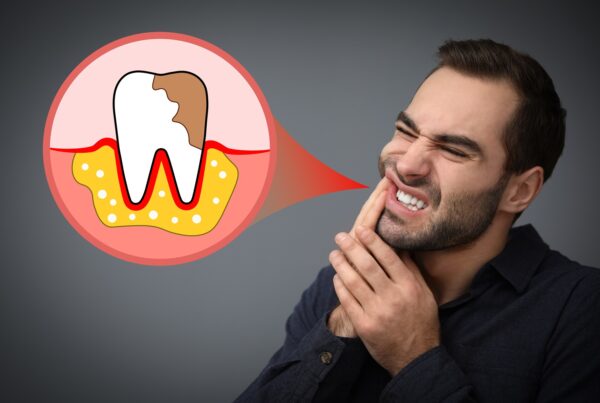Have you ever returned home from a dental appointment, still feeling a bit woozy from the anaesthesia, only to be surprised by an unexpected discomfort in your ear? It’s not uncommon for patients to experience some rather strange sensations after a tooth extraction, and ear pain after tooth extraction might just top that list. You might find yourself questioning if this discomfort is part of the healing process or if it’s something to be concerned about.
While we expect some swelling or soreness around the extraction site, ear pain can catch us off guard. It’s essential to remember that our bodies often communicate discomfort in ways we might not expect. The close proximity of the jaw and ear can lead to referred pain, where discomfort is felt in an area other than where it originates.
Imagine sitting at home, wondering if you should call the dentist. Should you be worried about this ear pain? Is it a sign of something more serious? Many of us have been in this situation, anxiously trying to determine if what we’re experiencing is normal. In this blog, we’ll explore the reasons behind ear pain after tooth extraction and discuss how to manage it effectively. By understanding the potential causes, you can approach your recovery with more confidence and ease.
Why Does Ear Pain Happen After Tooth Extraction?
After a tooth extraction, experiencing ear pain can be concerning. Understanding the reasons behind this discomfort can help you navigate your recovery with ease. Here are some common causes of ear pain after tooth extraction:
- Referred Pain: The close proximity of the jaw to the ear means that pain from the extraction site can sometimes be felt in the ear.
- Nerve Irritation: During the extraction, nearby nerves may become irritated, leading to sensations of pain radiating to the ear.
- Jaw Muscle Strain: The muscles used for chewing can become strained during the extraction, causing discomfort that can extend to the ear area.
- Swelling and Inflammation: Post-operative swelling around the extraction site can put pressure on surrounding structures, resulting in ear pain after tooth extraction.
- Infection: In some cases, an infection in the extraction site may spread, leading to discomfort that can manifest as ear pain.
- Changes in Pressure: After a tooth is removed, the pressure dynamics in the mouth and jaw may change, potentially causing sensations of fullness or pain in the ear.
- Sinus Pressure: If the extracted tooth is located near the sinus cavities, the procedure could lead to sinus congestion, which may also be felt as ear pain.
Understanding these potential causes can provide clarity and reassurance as you recover from your tooth extraction. If ear pain after tooth extraction persists or worsens, it’s always a good idea to consult your dentist for further evaluation.
Is Ear Pain Common? Tips to Manage Ear Pain After Extraction
Ear pain after tooth extraction is relatively common, especially when the extraction involves the upper molars, which are located close to the ear. While it can be concerning, many patients experience this discomfort as part of the healing process, often resolving on its own as the body recovers from the procedure.
If you find yourself dealing with ear pain after tooth extraction, there are several strategies to help alleviate your discomfort. Here are some effective tips to consider:
- Apply a Warm Compress: Gently placing a warm compress against your ear can help soothe pain and relax the surrounding muscles.
- Stay Hydrated: Drinking plenty of fluids can help reduce inflammation and keep your throat moist, which may help alleviate some discomfort.
- Avoid Hard Foods: Stick to soft foods for a few days post-extraction to minimize jaw movement and reduce the risk of aggravating ear pain.
- Practice Good Oral Hygiene: Keeping the mouth clean can prevent infections that might contribute to ear pain after tooth extraction.
- Gently Massage the Jaw Area: Lightly massaging the jaw can help relieve tension and discomfort, reducing referred pain to the ear.
- Consult Your Dentist: If ear pain persists or worsens, it’s important to seek professional advice to rule out any complications or infections.
- Maintain an Elevated Head Position: Keeping your head elevated while resting can help reduce swelling and pressure, providing some relief from ear pain.
- Avoid Smoking and Alcohol: Smoking and alcohol can impede the healing process and potentially worsen pain and inflammation. It’s best to avoid them during your recovery.
- Practice Relaxation Techniques: Stress can exacerbate pain perception, so engaging in relaxation techniques such as deep breathing, meditation, or gentle yoga can help ease discomfort.
- Use a Humidifier: Keeping the air humid can help prevent dryness in the throat and nasal passages, which might contribute to discomfort and ear pain after tooth extraction.

When is the Right Time to See a Dentist?
While some ear pain after tooth extraction can be normal, there are specific situations where you should consult your dentist. Being aware of these signs can help ensure a smoother recovery and prevent potential complications.
- Persistent Pain: If the ear pain after tooth extraction lasts longer than a few days or increases in intensity, it’s essential to seek professional advice.
- Signs of Infection: Symptoms such as fever, increased swelling, or discharge from the extraction site could indicate an infection requiring immediate attention.
- Severe Swelling: If you notice significant swelling around your jaw or face, it’s crucial to consult your dentist, as this could be a sign of a serious issue.
- Difficulty Opening Your Mouth: If you experience jaw stiffness or find it painful to open your mouth, it may be necessary to see a dentist to address any complications.
- Changes in Hearing: Any sudden changes in hearing, such as muffled sounds or a feeling of fullness in the ear, warrant a visit to the dentist for further evaluation.
- Unusual Symptoms: If you experience unusual symptoms like dizziness or ringing in the ears alongside ear pain after tooth extraction, it’s essential to get checked out to rule out any underlying problems.
- Unexpected Bleeding: If you notice excessive bleeding from the extraction site or if the bleeding doesn’t stop after applying pressure, it’s important to contact your dentist.
- Foul Odour: A foul smell coming from the mouth or the extraction site may indicate an infection, warranting immediate attention from your dentist.
- Difficulty Breathing or Swallowing: If you experience any difficulty breathing or swallowing, this could indicate a serious reaction or complication, and you should seek emergency dental care.
- Increased Pain During Healing: If you find that your pain is getting worse instead of improving over time, it’s essential to consult your dentist to determine the underlying cause.

Tips for a Smooth Recovery After Tooth Extraction
Recovering from ear pain after tooth extraction can vary from person to person, but following some essential guidelines can help ensure a smooth and comfortable healing process. Here are several tips to keep in mind:
- Follow Post-Operative Instructions: Always adhere to your dentist’s specific aftercare instructions, as they are tailored to your unique situation and can significantly impact your recovery.
- Rest and Take It Easy: Allow yourself ample time to rest after the procedure. Avoid strenuous activities or heavy lifting for at least 24-48 hours to prevent complications.
- Apply Ice Packs: Use ice packs on your cheeks for the first 24 hours to reduce swelling and numb the area. Apply for 15-20 minutes every hour, as needed.
- Stick to Soft Foods: For the first few days, consume soft foods like yogurt, mashed potatoes, and smoothies. This helps avoid irritation to the extraction site.
- Stay Hydrated: Drink plenty of water to stay hydrated, but avoid using straws, as the suction can disturb the healing blood clot.
- Avoid Smoking and Alcohol: Smoking and alcohol can hinder the healing process and increase the risk of complications. It’s best to avoid them for at least a few days after the extraction.
- Maintain Oral Hygiene: While you should avoid brushing the extraction site directly, it’s essential to keep your mouth clean. Gently rinse with warm salt water after 24 hours to help promote healing.
- Take Pain Medications as Needed: Use over-the-counter pain relievers as directed by your dentist to manage discomfort effectively.
- Watch for Complications: Be aware of any unusual symptoms, such as increased pain, swelling, or fever, and contact your dentist if you notice anything concerning.
- Schedule a Follow-Up Appointment: If recommended, ensure you attend any follow-up appointments to monitor your healing progress and address any issues that may arise.
The Importance of Regular Dental Checkups
Regular dental checkups are crucial for maintaining optimal oral health and preventing serious dental issues. These visits allow your dentist to perform thorough examinations, identify potential problems early, and implement preventative measures. For instance, during these checkups, your dentist can detect cavities, gum disease, and other oral health concerns before they escalate into more significant issues requiring extensive treatment. Additionally, professional cleanings remove plaque and tartar buildup that regular brushing and flossing may miss, helping to maintain healthy gums and teeth.
Moreover, regular dental checkups foster a proactive approach to dental health. They provide an opportunity for patients to discuss any concerns or changes in their oral health, enabling dentists to offer tailored advice and treatments. Establishing a routine of dental visits not only contributes to a healthier smile but also helps build a trusting relationship between patients and their dental professionals. This relationship can encourage individuals to maintain their oral hygiene practices at home, leading to improved overall health and well-being.
Conclusion
Finding the right dentist is essential for maintaining your oral health and ensuring a positive dental experience. A dentist who understands your unique needs can make all the difference in your comfort and confidence during treatments. When looking for a dental practice, consider factors such as location, the range of services offered, and the overall atmosphere of the clinic. Reading reviews and seeking recommendations from friends or family can also help you make an informed decision.
At American Dental Practices, we prioritize patient care and comfort, providing a comprehensive range of services tailored to meet individual needs. Our team of experienced professionals is dedicated to creating a welcoming environment where you can feel relaxed and well cared for. We believe that regular checkups and open communication are key to a healthy smile. Whether you’re seeking routine care or specialized treatments, we’re here to support your journey toward optimal dental health. Choosing the right dentist, like the skilled team at American Dental Practices, sets the foundation for a lifetime of healthy teeth and gums.






